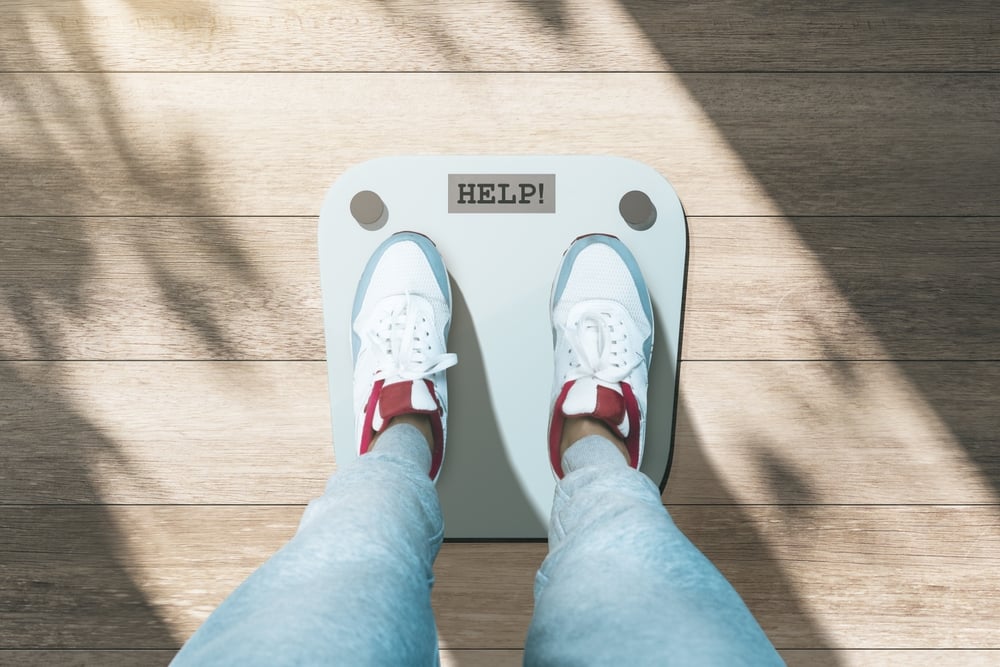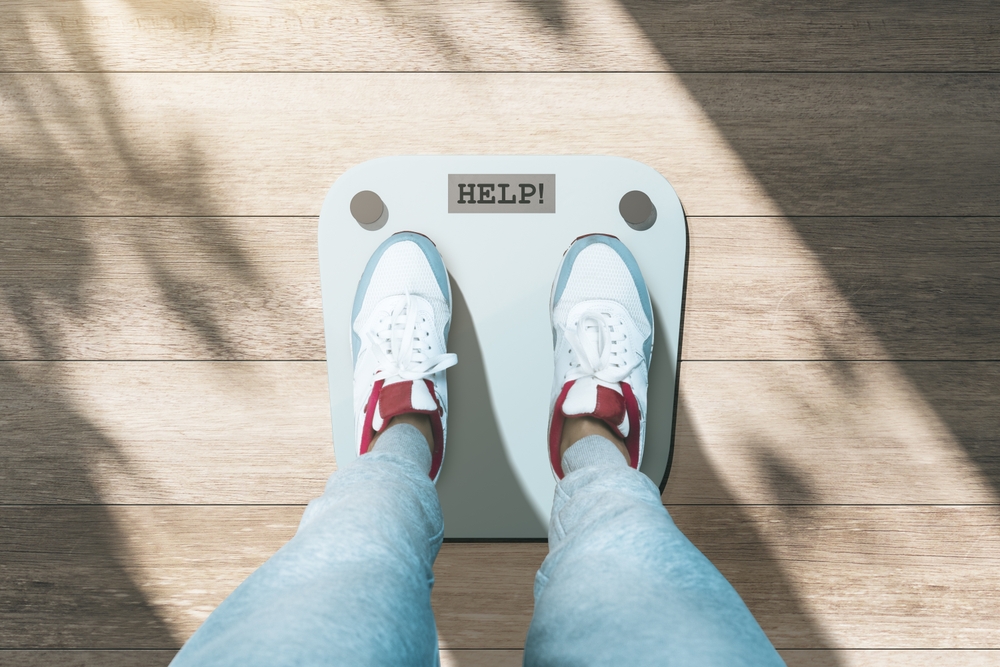Depressed Because You Can’t Lose Weight No Matter How Hard You Try?
 When you can’t lose weight no matter how hard you try or how little you eat, it can get depressing. You have likely already tried all the fad diets as well, which has only caused more frustration and disappointment and also failed to remove any significant amount of weight. When asking yourself “why can’t I lose weight?" the first step in answering this question is to find out what's happening in your body and why.
When you can’t lose weight no matter how hard you try or how little you eat, it can get depressing. You have likely already tried all the fad diets as well, which has only caused more frustration and disappointment and also failed to remove any significant amount of weight. When asking yourself “why can’t I lose weight?" the first step in answering this question is to find out what's happening in your body and why.
Key Takeaways
-
If you can’t lose weight despite eating less and trying hard, there is usually a physiological or lifestyle reason behind it.
-
Reduced mobility from medical conditions can make calorie burn nearly impossible without addressing the root cause.
-
Lack of activity does not always mean lack of effort, hormones, motivation, depression, and lifestyle constraints play a major role.
-
Aging alone does not automatically limit activity, but underlying medical issues often do.
-
Diet matters, especially excess carbs and alcohol, but activity levels still play a critical role.
-
Vein conditions are an often-overlooked medical reason for leg pain, fatigue, swelling, and reduced mobility that can block weight loss.
-
Understanding why weight loss is stalled is the first step toward sustainable progress.
There are people who have struggled with weight loss who experience reduced mobility due to health issues - those who want to be active and can't - and there are those without mobility issues - who can exercise but don't. These are the two types of people we are discussing here, but it's important to also note that there could be other medical conditions affecting a person's ability to lose weight.
People with Reduced Mobility
Some people have reduced mobility or reduced activity levels because of underlying health conditions. Perhaps you can relate. Fundamentally, weight loss is a combination of two things: diet and exercise. People with reduced mobility and reduced activity due to a health issue will struggle to burn the calories needed to lose weight.
You may want to stay active, but due to activity constraints, you simply cannot. Consequently, if you have limited mobility, it can be nearly impossible to lose weight simply by limiting your food intake. Some of the most common medical reasons for reduced mobility and, therefore, an inability to lose weight include the following conditions:
- Chronic joint pain or arthritis
- Back pain and spinal issues
- Vein conditions causing swelling and fatigue
- Autoimmune or inflammatory disorders
- Fibromyalgia
- Chronic Fatigue Syndrome
Find Solutions for Gaining Mobility
If you find yourself falling into this category and know that your weight gain and inability to lose is likely the result of reduced mobility or limited activity, your goal should be to get treatment to increase your activity level in some way. This can include thinking outside the box of the standard exercise regimen and considering ways to get more active while keeping your body safe. Consider lifting light weights, doing low-impact activities like swimming in an exercise pool, or taking up walking. Many people underestimate the impact adding a daily walk can have on their life. Keep your mind open to increasing your activity in different ways than more traditional offerings.
Even small steps matter. If traditional exercise feels out of reach, consider:
- Low-impact activities like swimming or water aerobics.
- Light weight training to build strength safely.
- Daily walks—often underestimated but highly effective.
The goal isn’t perfection—it’s progress. Modern medicine often treats symptoms, but your focus should be on improving overall activity and circulation.
It’s important to note that therapy is directed towards symptoms in most cases, not physical activity. However, your goal is to increase your ability to be active. Modern medicine focuses on treating symptoms, which admittedly might not be your main goal or what’s most important to you. Therefore, your ultimate goal should be improving your overall activity level and your health instead of focusing solely on the symptoms of your condition.
Possible Reasons Why People Struggle to Lose Weight
The second most common category that characterizes people who tend to struggle with weight loss is those who do not currently have activity or mobility issues but still are experiencing a reduction in activity. The solution lies in understanding the reason behind the reduced activity, where for whatever reason, you aren't as active as you used to be. Consider the following factors that could be behind your lack of activity when a mobility issue isn’t part of the problem:
-
Could Leptin Resistance be Holding You Back?
Leptin is a hormone that is secreted by fat cells. Its function is to increase activity and metabolism and decrease hunger. But with obesity, your body becomes less sensitive to leptin. Your metabolism doesn't rise, your activity doesn’t increase, and your appetite isn’t suppressed as readily. What that means is you must make a conscious effort to burn more calories.
-
Is Motivation the Missing Piece?
If you've struggled to lose weight for an extended period of time, it can affect your mindset. You no longer feel the same sense of passion for tackling weight loss that you may have at the beginning. The trick is to stay active, even when you don't feel like it. Exercise triggers the release of endorphins and endorphins cause good feelings. When you don't feel like exercising, do it anyway. You'll feel better afterward. -
Could Depression Be Playing a Role?
If you struggle with depression, talk with your healthcare provider. Medication may be needed to regulate your body's chemical balances. Exercise also helps improve your mood, gets you outside and in the sunshine, and lowers anxiety. -
Are Lifestyle Limitations Holding You Back?
If you have a job that limits your activity or if you live primarily a sedentary lifestyle, you won't burn the calories needed to lose weight. Make the time, even if it's just 20-30 minutes a day, to get out and do something active. If outdoor walking isn’t possible, consider gyms, indoor tracks, or community centers. -
Could Other Medical Conditions Be Holding You Back?
Conditions like sleep apnea, thyroid conditions, certain hormonal conditions, smoking cessation, excess fluid from heart or kidney disease, etc. Talk with your healthcare provider if you think this is what's going on for you. -
Is Aging the Reason You're Less Active?
Another culprit many people blame for a reduction in activity or a mobility issue is the inevitability of just getting older. It's important to find out if your current struggle with reduced activity is a function of age or of an underlying medical condition. When determining whether your lack of movement is simply part of the natural aging process or you have an issue, ask yourself the following questions:
Ask yourself:
-
- Can you still do most activities, just at a slower pace? If yes, aging may simply be slowing you down.
If this is the case, it’s likely that your reduced activity is simply the result of getting older. Age limits the pace at which we are able to be active, and not necessarily the activities themselves. - Do you need frequent breaks or feel unable to keep up? If yes, a medical condition may be interfering.
If you are unable to do what you used to do and need to take breaks or stop and sit, there could be a reason behind this that is medical in nature and doesn’t have anything to do with your own personal motivation.
Distinguishing between natural aging and treatable conditions is crucial for effective weight management.
- Can you still do most activities, just at a slower pace? If yes, aging may simply be slowing you down.
-
Is Your Diet the Reason You are Struggling to Lose Weight?
Even if you’re active, your diet plays a massive role in overall health and fitness. What you eat can directly impact your energy levels, recovery, and progress. Two common culprits that often go unnoticed are:
-
- Alcohol: Hidden calories and appetite stimulation.
- Carbs: Highly addictive and easy to overconsume.
Therefore, people who eat lots of carbs tend to eat more than their bodies can process, which leads to weight gain and an inability to lose weight. Low-carb diets are best and often prove to be the most effective for those struggling with stubborn weight. Reducing alcohol intake and focusing on whole, nutrient-dense foods can reset your metabolism. -
Could a Vein Condition Be the Reason?
It’s important to realize there could be a very real and medical reason behind why you find yourself unable to do as much as you once did and subsequently unable to get those extra pounds. Many people don’t realize that a vein condition could be one of these contributing factors.
To determine if this might be happening in your case, ask yourself if your legs hurt.
-
- Are they swollen at the end of the day?
- Do you want to keep up with your family and friends when engaging in activities, but you just can’t?
- Do you need to sit down and rest, especially in the evenings and at night?
One overlooked medical factor is venous insufficiency. Poor circulation can cause:
-
- Leg pain and swelling.
- Fatigue and reduced stamina.
- Difficulty keeping up with family or friends.
Importantly, vein conditions don’t always show visible varicose veins. Many people assume they’re fine because their legs look normal, but hidden vein issues can still drain energy. With a vein condition, some people will have visible leg veins, others will not.
How Vein Treatment Can Help:
Restores healthy circulation: By treating damaged veins, blood flow is redirected to healthier vessels, improving overall circulation and preventing blood from pooling in the legs.
Reduces swelling and discomfort: Correcting underlying vein issues alleviates common symptoms like swelling, aching, throbbing, and heaviness in the legs.
Boosts energy levels: When your circulation improves, your body's cells receive oxygen and nutrients more efficiently, which can lead to increased energy and reduced feelings of fatigue.
Makes activity—and therefore weight loss—achievable again: With less pain and swelling, physical activities like walking and exercising become more comfortable and manageable, helping you pursue a healthier, more active lifestyle.
One easy way to improve your weight loss situation is to increase activity by optimizing your vein circulation. Vein treatments work. There is no downtime after treatment, and most people say they feel better afterward and have more energy than they have had in years.
Knowing The Why Behind Your Weight Loss Struggle
The first step towards solving your problem with weight loss is understanding why you can’t lose weight. Is there an underlying medical condition or is it something else? Once you know this, you can begin taking the appropriate steps toward making positive changes.
The way to address this issue begins by determining the reason behind your lack of activity. When evaluating yourself, you might need to reach out to others to get a good idea of what is really going on.
Ask your family and friends - people you know will be honest with you - if you fit into the above categories. Ask them if they have noticed a decline in your activity level and find out how you are doing now compared to where you were in years past. In many cases, the changes that take place in our habits are so gradual we don’t even notice them, but others around us might.
Frequently Asked Questions
1. Why can’t I lose weight even though I’m eating very little?
If activity levels are low due to mobility issues, medical conditions, or hormonal resistance, calorie restriction alone often isn’t enough to trigger weight loss.
2. Can reduced mobility really prevent weight loss?
Yes. When the body cannot burn enough calories through movement, weight loss becomes extremely difficult regardless of diet changes.
3. Is aging the reason I’m less active now?
Not always. Aging may slow your pace, but if you physically cannot do what you once did, there may be an underlying medical condition involved.
4. What medical conditions commonly affect weight loss?
Joint pain, back pain, autoimmune disorders, fibromyalgia, chronic fatigue syndrome, vein conditions, thyroid issues, sleep apnea, and hormonal imbalances can all play a role.
5. How do vein conditions affect weight and activity?
Vein conditions can cause leg pain, swelling, fatigue, and heaviness that limit movement. Improving circulation can increase activity tolerance and energy levels.
6. Does exercise still matter if motivation is low?
Yes. Exercise helps regulate hormones, improves mood through endorphins, and often restores motivation after consistency is established.
7. What role does diet play if I’m already active?
Excess carbs and alcohol are common contributors. Both can increase calorie intake beyond what the body can process, even with regular activity.
8. What should I do first if I can’t lose weight?
Start by identifying the real reason behind reduced activity or stalled progress. Once you know the “why,” the right solution becomes much clearer. If you suspect a vein condition, simply schedule a free vein screening.




